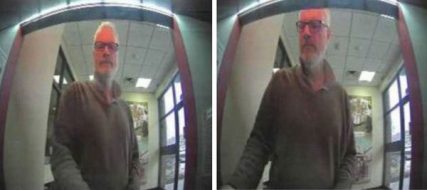(RNS) — As a Methodist minister, the Rev. Jeffrey Edwards takes the Ten Commandments seriously.
Especially the ones about not stealing or bearing false witness.
Both were broken, he said, in an incident last year when he was falsely arrested and wrongly charged with depositing forged checks into his bank.
It was a “traumatic” ordeal, said Edwards, pastor of United Methodist Church of Parsippany, a congregation in Morris County, New Jersey.
Edwards recently filed a civil suit in March in Morristown Superior Court, charging Wells Fargo Bank of negligently associating him as the suspect in a fraudulent check plot perpetrated April 16, 2018, at an ATM at a local branch. The 63-year-old says he wants the New Jersey State Police and Wells Fargo to be held responsible for the arrest and accompanying humiliation brought on by falsely labeling him a criminal.
He said that state police posted photos of him at the ATM, taken by Wells Fargo, on Facebook. Edwards learned about the photo after a parishioner texted him.

ATM photos of the Rev. Jeffrey Edwards, courtesy of New Jersey State Police
“I saw this photo of me, provided by Wells Fargo, had been shared 460 times in a few hours,” he said. “There was immediate panic that there would be hundreds of people in my local community who would recognize me.”
Edwards worried that people would believe he is guilty, especially at a time when “there has been a lot of broken trust with religious authority figures,” he said.
According to Edwards and the lawsuit, the ordeal started when four checks issued by the New Jersey Turnpike Authority were used by someone to counterfeit four separate fraudulent checks using the same check numbers and account numbers.
The fake checks, totaling over $6,000, were made payable to a woman named Tyler Mathis, according to published reports, and then were cashed at the same Wells Fargo branch Edwards had deposited his own checks at that morning.
Wells Fargo notified the state police when it discovered the fake transactions, according to the lawsuit. The bank was asked to provide images taken at the ATM where the checks were deposited and cashed.
The bank reportedly sent photos of Edwards, and a Wells Fargo employee told state police investigators that she could not automatically link the check numbers to the pictures. But according to the lawsuit, she offered to hand-write check numbers on the photos of the man they determined had deposited the counterfeit checks — incriminating Edwards.
“My feeling is that Wells Fargo just did whatever they could to quickly get the police off their back,” said Edwards.
Detectives eventually summoned Edwards on Sept. 5 to meet at the State Police headquarters in Holmdel. Edwards believed he was coming to clear up the matter, perhaps even receive an apology.
Instead he was charged with a third-degree felony, punishable by three to five years in prison and a fine of up to $15,000. He said that officers tried to pressure him into admitting guilt, saying that a jury would believe bank fraud experts rather than the pastor.
Those charges were later dismissed.
The pastor said he forgives officers and bank employees involved in the case.
“But what I cannot forgive is this culture that forces people to admit to crimes they did not do,” he said.
New Jersey State Police Trooper Alejandro Goez said department policy does not permit comment on pending litigation.
A Wells Fargo spokesperson also declined to comment.
“We were recently served with the complaint and are reviewing it. Since this is a pending legal matter, we are unable to comment any further,” Stephanie Ahenkora told RNS.
Mathis, the individual to whom the fraudulent checks were written, confessed to her role in the crimes, according to the lawsuit. She allegedly only knew her accomplice as “Cousin Swing” and was not prosecuted.
After three required court appearances, Edwards’ case was dismissed for a lack of evidence on Jan. 16.
Still, the damage to Edwards’ reputation remains, said Gerald Krovatin, Edwards’ attorney.
“Wells Fargo’s conduct tarnished the unblemished reputation that Pastor Jeff has enjoyed for more than 30 years of ministry,” Krovatin said. “That was inexcusable on the Bank’s part and they have yet to even apologize for the harm they have caused to him.”
Edwards is seeking unspecified damages but said it is too early to know what he would do with the money.
The pastor said that being arrested gave him more sympathy for those who are accused of crimes but don’t have the ability to fight those charges. Edwards said he is thankful that he was able to afford an attorney but knows not everyone else is.
“I was under immense pressure to confess to something I did not do,” he said. “It’s being at the wrong place at the wrong time, and if this can happen to me it can happen to anyone else. It can happen to someone more vulnerable.”





